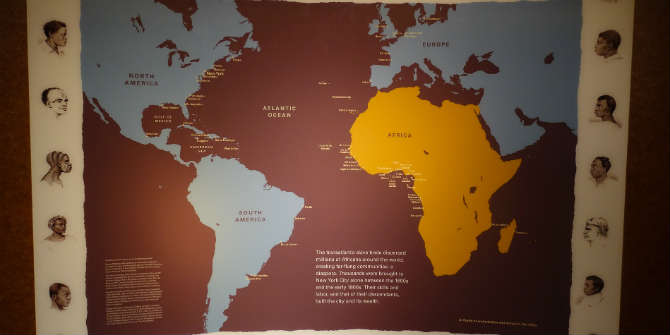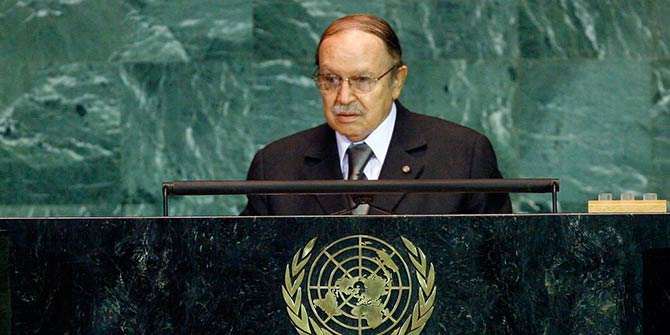LSE’s Portia Roelofs calls this book an important new resource for those concerned with public action to build peace in northern Nigeria
There are a lot of books about Boko Haram out at the moment. Creed and Grievance: Muslim-Christian Relations and Conflict Resolution in northern Nigeria, edited by Abdul Raufu Mustapha and David Ehrhardt, is probably the most important new resource for those concerned with public action to build peace in northern Nigeria. It provides much-needed context to discussions of the current conflict in the Lake Chad basin, locating it in a wider historical trajectory and socio-political context, as well as a comparative perspective with other conflicts in Nigeria including herdsmen-farmer conflicts and indigence-settler violence in Plateau state.
The book starts from the premise that ‘religions move and intertwine’ (Juergensmeyer 2003:4) and looks at how Islam and Christianity ‘rub against each other’, “sometimes peaceably, sometimes, less so, sometimes for the common good, and sometimes for narrow sectarian ends.” (1) Methodologically, the books expand existing work (Roelofs 2014) on how narratives, or ‘the meta-conflict – the conflict over the meaning of the conflict’ (Horowitz 1991), function to draw and calcify battle lines in the north. The title’s pun on Colliers theory that conflict results from either greed or grievance aptly captures the book’s rejection of reductive accounts of socio-economic deprivation automatically leading to conflict, and instead pays attention to the evolving heterogenous visions of the good that motivate political contestation in the north.
Similarly, it rejects a ‘clash of civilisations’ understanding of conflict and deals with the dominant religious stereotypes and ‘stylised facts’ head on. “Are northern Muslims any more violent than other Nigerians?” Mustapha asks, “If they are, are the causes cultural, or historical, political and economic, and therefore far more subject to public policy engagement?” (3)
In chapter two Ostien gives an overview of the diverse and evolving Muslim groups in the north, offering well-grounded estimates of the country’s overall religious make-up.
The third chapter provides an overview of the ‘body of Christ’ in Nigeria and an interesting account of how Christian groups play changing political roles from state to state. The chapter is brought to life by tales from Ehrhardt’s fieldwork in Kano, about the role of pastors in assuaging the trials and terrors of their congregants’ nocturnal lives (97-8).
The collaboration between the book’s editors and Rachel Diprose in chapter 4 provides fascinating insights into the historical roots of the interfaith encounter in northern Nigeria, situating contemporary fears of Islamisation and Westernisation in the contradictory effects of British colonization on both Muslim and Christian institutions in the north.
Chapter 5 by Mustapha and Aminu Gamawa on sharia law and legal pluralism exemplifies the book’s approach of going beyond monolithic and sensationalist accounts of religion by looking at the multiple and varied sources of support for sharia in the early 2000s in northern Nigeria. In Chapter 6 Marc-Antoine Pérouse de Montclos shifts the book’s focus to the north-east and offers a range of new empirical insights into the development of Boko Haram and its antecedents. Meagher’s chapter brings the reader firmly back to the everyday world of okada riders, sewing machines, power cuts and goats head soup. Comparative analysis of competing, conflicting and complementary informal economic activities in Kano and Kaduna shows that informal institutions have the potential to promote inter-religious cooperation and diffuse tension. However, this harmony is fragile in the face of increasing geographical segregation and political manipulation.
In Chapter 8 Mustapha, Higazi, Jimam Lar and Karel Chromy situate the interfaith encounter in Jos within struggles over ‘ownership’ of the city, indigeneship and the control of economic and political resources. It shows how the narratives of ‘hegemonic expansionism’ that are invoked by commentators to make sense of Boko Haram are equally present and misleading in the case of Jos (227). The overall theoretical perspective – that “a series of political and administrative changes from [the 1970s] re-shaped political opportunities and how the Christian indigenes and the Muslim settlers (re)interpreted the structural characteristics” of the town – would provide the starting point for future comparative analysis with conflicts elsewhere.
Adam Higazi’s chapter (nine) on rural insecurity on the Jos plateau provides a timely account of extreme religious violence which has largely been neglected in the scholarship. Considering the growing recognition of the threats posed by herder-farmer violence across West Africa, Higazi’s in-depth analysis will no doubt be of interest to many. He highlights how extreme violence has been perpetrated by members of all communities along cross-cutting religious, ethnic and occupational lines. The Berom-dominated Plateau State government of Jonah Jang from 2007-2015 comes in for particular scrutiny. The Governor’s indifference to rural conflicts and denial of its Muslim victims is identified as a causal factor in spiralling violence.
Jointly authored chapter 10 offers a compendium of various peacebuilding initiatives and commissions of inquiry in Jos since the early 2000s. It outlines the ongoing responses to the security dilemma faced by Berom and Jasawa in the city. Rather than seeking to provide a final answer to the ongoing citizenship question that pits individual rights of settlers against group rights of indigene communities, the chapter argues that reconciliation will be found in the “practical everyday politics of inclusion and accommodation – statecraft” (333).
In this vein, the concluding chapter identifies informal “social resources for cooperation” (342), including informal rules, associations and networks, as vital to ongoing inter-religious harmony. However, these informal resources cannot endure in the face of increasing geographical segregation and state indifference (343). The authors’ recurring example of ‘inclusive statecraft’ (ch 10 334 and conclusion 343-344) is power-sharing where representatives from each community are appointed to official positions i.e. the appointment of an aggrieved group to a senior government or political role. This is quite an endorsement, albeit tacit, for the rather unfashionable Federal Character Principle and it would have been be interesting to see this tokenistic but apparently effective institution interrogated more explicitly.
The volume gives a strong sense of an ongoing conversation between scholars in the field, with 6 of the 11 chapters being joint efforts between up to 4 co-authors. As such, there inevitably is a degree of repetition of background information between the chapters: conversely, this means each would easily stand alone for those who wants to read from the book selectively. In places there is a sense that one can’t see the wood for the trees, with the analytical thrust lost under a deluge of descriptive information. Readers who are interested in the generalisable lessons, as opposed to details of the cases, will find it heavy going at times (especially in chapters 2, 5,10). Overall, however, the book is a testament to the collaborative ethos that has come to define the sub-discipline of Nigerian studies and which the book’s late co-editor, Abdul Raufu Mustapha, had a central role in nurturing. Recent developments re-centring the international academic debates squarely within Nigerian universities – notably the growth of Lagos Studies Association and the New Research in Nigeria Day co-hosted by Obafemi Awolowo University and Oxford in Ile-Ife in 2017 – justify optimism that this legacy will continue to flourish.
Creed & Grievance: Muslim-Christian Relations & Conflict Resolution in Northern Nigeria. Mustapha, A.R., Ehrhardt, D., 2018. Boydell and Brewer.
Portia Roelofs (@whowhywherewhen) is a LSE Fellow in the Department of International Development at LSE.
The views expressed in this post are those of the author and in no way reflect those of the Africa at LSE blog, the Firoz Lalji Centre for Africa or the London School of Economics and Political Science.







